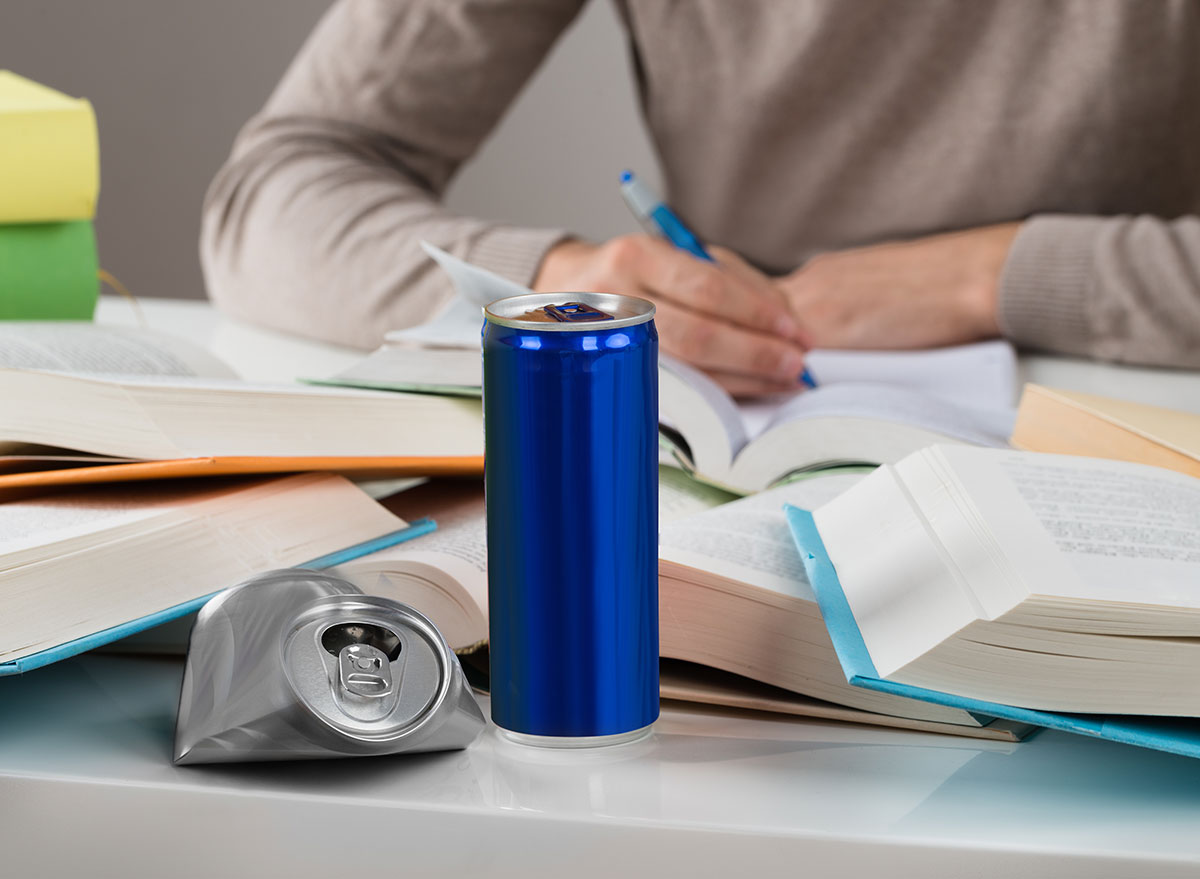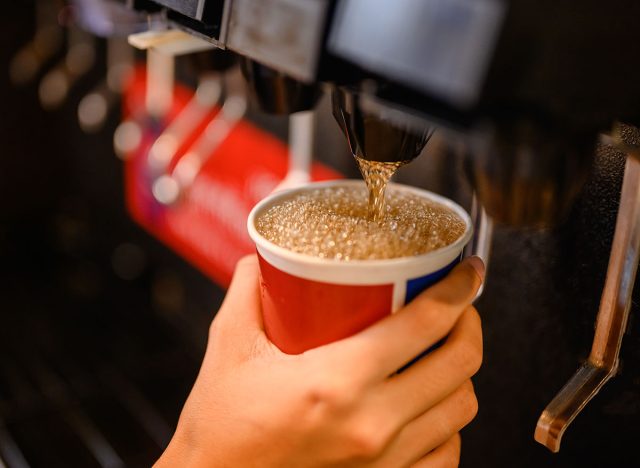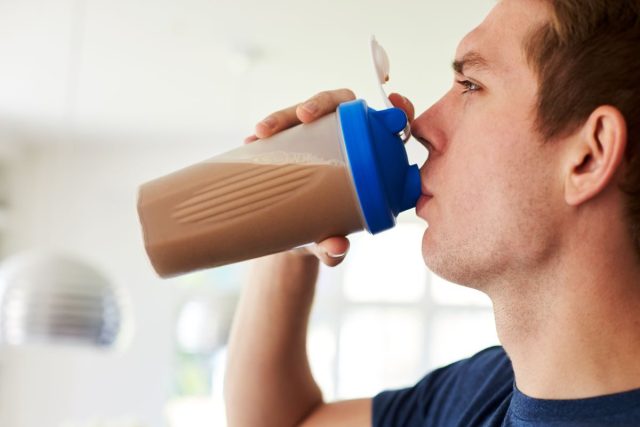6 Worst Drinks for Brain Health, Says Dietitian

Afraid of developing dementia in your golden years? You’re not alone, especially if you have a family history of Alzheimer’s or another form of dementia. But developing dementia doesn’t need to be your fate. More research shows that a healthy lifestyle, including what you eat—and drink—can help lower your risk.
According to a report by the Alzheimer’s Association, “one in three seniors dies with Alzheimer’s or another dementia. It kills more than breast cancer and prostate cancer combined.” Also, in 2022, approximately 6.5 million Americans age 65 and older were reportedly living with Alzheimer’s, and rates are expected to keep increasing as our overall population ages.
How do drinks impact your brain health?
As part of a preventative strategy to reduce your risk of dementia, it’s important to pay attention to what you eat and drink, your daily exercise, and also avoid tobacco while keeping your weight in check. What you drink has a profound impact on your overall health, body weight, and brain health. Specific beverages are the primary contributors of not-so-healthy nutrients in the diet like added sugars. According to the American Heart Association, nearly 50% of added sugar in the U.S. diet comes from sugary beverages.
The leading beverage contributor of added sugar is regular soft drinks, which make up 25% of the daily added sugars in the U.S. diet, followed by fruit-flavored drinks at 11% of the total daily sugar intake. Sports drinks and sweetened coffee and tea round out the other major sources of added sugar. These beverages provide more sugar than sugary desserts and other sweets, which contribute a mere 3% of the added sugar in the average American’s diet.
To help you stay sharp as you age, here are the beverages to steer clear of—and for more healthy tips to support your cognitive health, be sure to check out This Eating Habit May Harm Cognitive Function, New Study Says.
Sugary Beverages

According to a 2017 report from the CDC’s National Center for Health Statistics, nearly half of all adults have one or more sugar-sweetened beverages—i.e, regular soda, fruit-flavored drinks, sports drinks, horchata and others—per day. That comes to about 150 calories or 37 grams of rapidly absorbed sugar calories per day. The upper limit on added sugars has been set by the AHA is 36 grams per 150 calories for men and 25 grams per 100 calories for women.
Sugar is detrimental for your grey matter because it’s linked to metabolic conditions like cardiovascular disease, stroke, metabolic syndrome, inflammation, and type 2 diabetes. Foods that increase risk for cardiovascular disease also increase risk for dementia, because keeping your grey matter healthy for life involves keeping the millions of blood vessels that support your brain clear of plaque associated with heart disease.
In one recent study published in the Journal of Prevention of Alzheimer’s Disease, the authors found that those who reported having the most sugar-sweetened beverages were about three times more likely to suffer from dementia, compared to those who did not drink sugary drinks. Risk for stroke was also doubled among those drinking the most sweetened drinks.
Research from the Harvard School of Public Health also shows that individuals who drink one or more sugary beverage per day are more likely to have poorer memory, smaller overall brain volume, and a significantly smaller hippocampus, the area of the brain linked to memory and learning. The authors suggest that sugary drinks are linked with symptoms of preclinical Alzheimer’s disease.
As the leading source of added sugar in the typical U.S. diet, cutting back on regular soda is one way you can help keep your mind healthy and sharp as you age. A 12-ounce can of soda packs in about 150 calories and 37 grams of sugar—more than you should have in an entire day.
Milkshakes
Milkshakes are an ultimate indulgence for many, but the sugar and saturated fat are a double whammy for your brain’s health. Saturated fat, present in full-fat dairy foods, fatty meats, butter and coconut and palm oils are known to increase LDL-cholesterol levels.
Studies show that high cholesterol can significantly increase one’s risk for dementia. In fact, three large human population studies have found that high intakes of saturated fat doubled the risk of Alzheimer’s disease, while diets with unsaturated fats lower the risk. A medium chocolate shake from McDonald’s has 650 calories, 85 grams (aka 21 teaspoons) of added sugar, and 11 grams of saturated fat—or more than half of the total saturated fat you should have in an entire day.
Specialty Coffee Drinks

Regular coffee and tea without including any added sugars can be a great way to increase the beneficial antioxidants and other plant-based nutrients in your diet, but many coffee drinkers prefer their beverages sweetened. If you enjoy specialty coffee drinks from your favorite coffeehouse, you may be getting a surprising amount of added sugar and unhealthy saturated fat.
Common drinks like mochas, flavored lattes, frappes and others can pack in the same sugar as two, 12-oz cans of soda. For example, a Starbucks 16-ounce Toasted White Chocolate Mocha Frappucino has 420 calories, 64 grams (16 teaspoons) sugar, and 10 grams saturated fat. These sugar-, fat- and calorie-rich options are equivalent to eating cake or several chocolate chip cookies. If you want a healthier pick-me-up, as for sugar-free flavorings and have your drink made with skim milk.
Sports Drinks
Unless you’re a competitive athlete, you’ll want to limit the amount of sports drinks (Gatorade, Powerade, Accelerade, etc.) you drink each day. Sports drinks can be detrimental to your brain health, especially to your brain’s grey matter.
One of the reasons why these drinks can be so insidious is that they’re marketed as healthier alternatives to soda. While sports drinks play an important role in the diets of top athletes and to maintain hydration during endurance-type events, most average weekend warriors can drink water or calorie-free electrolyte replacement tabs in lieu of sports drinks.
A typical 20-ounce bottle of a sports drink like Gatorade has 140 calories and 34 grams (8.5 teaspoons) of sugar. That’s all the sugar that adults should have in a day. Like soda, the sugar in sports drinks may up your risk for weight gain, type 2 diabetes, cardiovascular diseases, and neurological issues. A better alternative for a sports hydration solution is an electrolyte tablet or powder with no or minimal added sugar like LMNT, Nuun, DripDrop Ors, or Ultima.
Recovery Drinks

Similar to sports drinks, recovery drinks are designed for serious athletes. They are made specifically with a 4:1 ratio of carbs to protein, and are designed specifically to stimulate the replenishment of fluids, carbohydrates, and protein.
The reason why they’re not-so-health for your brain health is that they are calorie-rich and they are made with simple carbohydrates. For example, a serving of Endurox R4 Recovery Smoothie has 280 calories and 39 grams (around 10 teaspoons) of added sugar. Unless you are a serious athlete who has a hard time maintaining your weight, there is little reason to add these beverages to your diet.
Caffeinated Energy Drinks
Red Bull, Rockstar, Monster, and other caffeinated energy drinks were initially developed for extreme athletes or to help college students wake up or stay awake, but they have no benefits when it comes to maintaining your brain health due to their high-sugar counts. For instance, a 12-ounce can of Red Bull has 168 calories and 37 grams (9 teaspoons) of added sugar. An original flavor 16-oz Rockstar energy drink has 260 calories and 63 grams (nearly 16 teaspoons) of sugar. If you want the caffeine that these types of drinks provide, looks for sugar-free flavors.







